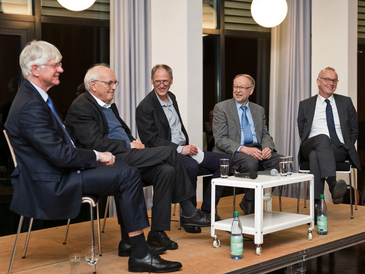This is what the President of the University of Bremen, Professor Bernd Scholz-Reiter, said when asked how things will continue with the University of Bremen. The occasion was a panel discussion held in the Focke Museum. As part of the exhibition “Protest and new beginnings: Bremen after 68”, the organizers invited Scholz-Reiter and three former Presidents to take part. On the podium were 47 years of university history: Professors Thomas von der Vring (the Founding President of the University of Bremen), Jürgen Timm (University President from 1982 - 2002), Wilfried Müller, his successor until 2012, and Bernd Scholz-Reiter.
“Paradoxical Situation”
Scholz-Reiter described the current situation in which the University finds itself as “paradoxical”. He pointed to recent major achievements and accolades such as Leibniz Awards, Collaborative Research Centers, and ERC Grants. Former President Wilfried Müller said of the recent DFG decision to accept only one application for an excellence cluster: “It was a depressing day for me.” In his opinion there has been an overall tightening of requirements in the new excellence strategy. As he pointed out: “The reputation of the competition has become so great that more and more universities are participating!”
Opening the University for working-class children
The event gave the audience interesting insights into the history of the University. For instance, the Founding President Thomas von der Vring, who took office in 1970 at the age of 33, reported on the completely different task with which the Reform University Bremen had begun. “We wanted to create a deliberate contrast to the traditional hierarchical university by offering practical and project-oriented study. Our mission was to enable as many working-class children as possible to enter higher education.” Initially, twelve percent came from this social class, as well as many second-chance professionals. Jürgen Timm reported a depressed mood among the professors in the early 1980s. The start-up funding provided by the federal government and the Länder dried up, giving rise to a veritable brain drain.
A new start: High-profile research areas
The new start entailed sharpening profile in selected research fields by creating so-called high-profile research areas. Finance was sought from private foundations, junior professorships were established, and applications for third-party funding became more professional and increasingly successful.
How to proceed going forward?
How should we continue with the University of Bremen in the future? This question was also at the center of the discussion. All four presidents agreed that the relationship between the University and the city of Bremen could be further improved. Bernd Scholz-Reiter underlined the “leverage effect” exercised by the University: For every euro invested in the University, the city of Bremen receives an almost threefold return in value added. The panel also agreed that the campus makes an important contribution to further developing Bremen as a technology location. Former President Müller emphasized another task that has to be addressed: “We must act as a source of information and criticism for the deficits emerging in our democratic system.”

